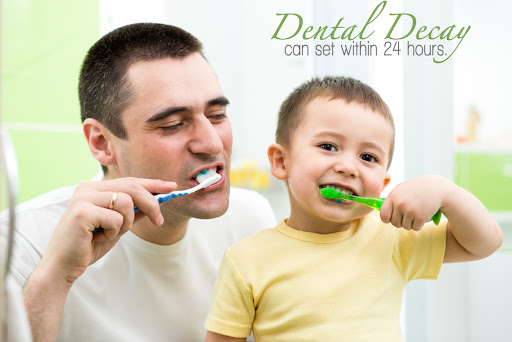
Painful, infected teeth are not a pleasant experience, but they are common symptoms of tooth decay. The good news however is that tooth decay is preventable. Your best defense against decay is a daily oral hygiene routine, as well as regular visits to our office. It can be helpful to know more about tooth decay and what causes it so that you are better equipped with the knowledge to prevent it.
More Than Just Sugar
Sugar is a leading cause of tooth decay. Sugar build-up and deposits on your teeth lead to the erosion of the tooth. While it is important to be mindful of the sugary products you are consuming, sugar is not the only culprit in causing tooth decay. Acids can also damage your teeth. Foods that are high in acidic content can speed up the process of decay. Our dentist suggests you avoid drinks and candies with high sugar or acid content. If you find yourself consuming such things, make sure to keep up with your daily oral hygiene routine.
The National Institute of Dental and Craniofacial Research recommends avoiding snacks between meals, limiting sugary drinks and fruit juices, and not eating or drinking before bedtime after brushing.
You Can’t Always Tell
Decay doesn’t always have noticeable signs. When discomfort is felt, it could be a sign the decay has spread beyond one tooth. In other words, by the time you do feel it decay is far along. This can be prevented by regular visits to our office. Our doctor can help identify potential issues early and you will receive the best possible treatments for your teeth.
Teeth with Fillings Still Need to Be Cared for Properly
Previous fillings do not mean that your teeth are free of decay forever. It is essential you maintain proper daily care of your teeth. It is possible to develop decay around existing fillings, so be sure you are taking extra care especially around fillings. If you feel your existing fillings are giving you trouble, schedule an appointment to see us.
Tooth Decay Not Just a Kids Thing
All age groups are equally at risk of developing tooth decay. Parents should keep an eye on their children’s sugary snacks and treats, but this advice holds true for everyone. Senior citizens are particularly vulnerable because of certain medications can damage their teeth. It is essential that all age groups are receiving twice-yearly dental examinations.
Tooth decay is a common dental issue. However, with the right knowledge you can prevent damage to your teeth. Watch your diet and make sure you limit sugary candies and snacks. Remember, you won’t always be able to see or feel decay, so contact our office to schedule a regular visit.
For more helpful tips on preventing decay, or to schedule an appointment, contact our office.







